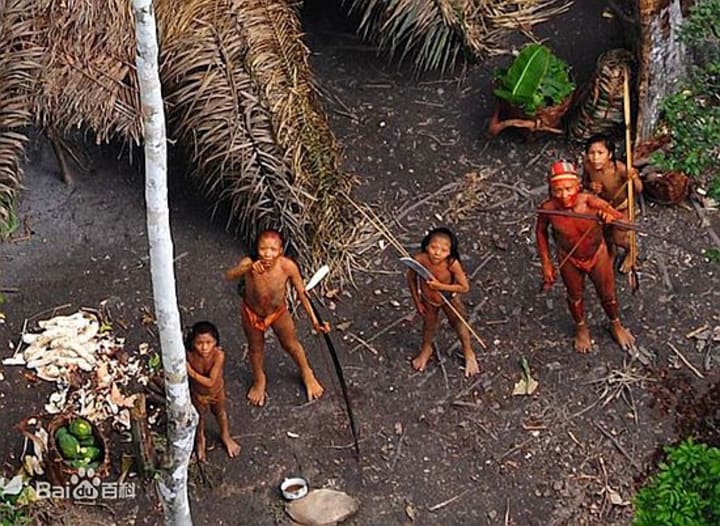
When it comes to thinking about first contact scenarios we tend to default to imagining humanity versus a more advanced alien race. Typically this comes in the form of massive spaceships orbiting the earth, hovering above our cities and counting down the hours until they attack. It’s the Independence Day scenario, or more recently Arrival, a film that gives this trope a new, more conscientious spin. In Arrival the Septopods arrive on Earth, and it is us who are on the brink of hostility towards them, rather than them being a clear threat to us. In the film Avatar, it is us who are the more advanced race, and while we don’t see our first contact scenario with the Navi, it is this angle that I want to explore; human supremacy over the other; a scenario that we have actual evidence to draw from.
Now you may be wondering when we may have been in contact with a less advanced race than our own, but the fact is that we have, many times. While all of the above examples are of human versus extraterrestrial, our history—and even our present—is littered with points in time where we have come across more primitive civilisations of our own species. Human versus human, in first contact scenarios. The results of these unions are mixed at best but tend to edge closer towards disastrous for the less technologically advanced peoples. We can look at Caesar landing in Britain for the first time, or Columbus arriving in the Americas, and while historic examples are full of interesting observations that would merit their own article, I would like to concentrate on something a bit more chronologically close to home; I want to discuss the present day scenarios of first contact, ones that we as a civilisation have a direct connection with, and thus a possibility of directly influencing.

Over the last few decades we have been making contact with groups of people who live an existence akin to that of the stone age, tucked away within the Amazon. This contact has not always gone particularly well, especially when the people that are most likely to encounter them are working for industries dedicated to destroying their natural habitat. Humanity have noticed that these tribal people are there, but have treated them not unlike we treat ants; not caring at all for their colony as we bulldoze through it. This, obviously, is not a good way to make first contact. They must see our tree felling machinery as unimaginably powerful tools of war, of monsters from the unknown, having no real comprehension of what they’re actually doing, not realising that our tools of war are a damn sight scarier and capable of far more than cutting down trees and spouting out pollution.
This is both a good and a bad sign. The good being that we have no actual desire to wage war on these people, and the bad being that in order to gain what we want from their land we don’t actually need to wage war on them at all. They may be in a state of total war, waged against our logging machines, fighting them to the death, but to us it is—realistically—so inconsequential that we barely take notice that it is happening at all. Being knowledgeable about these tribal people that populate pockets of the rain forests is seen as almost esoteric. Seeing this non-relationship with these unknown people begs the question; if aliens arrived here, in their city sized ships, and began wiping us out would they even see it as a war? We may be at battle stations, doing everything within our power to grip onto civilisation as we know it, fighting tooth and nail to prevent our own annihilation, but would these aliens even notice? Would it simply be their version of industrial action taken on a world that has resources that they want?

There are, on the other hand, examples of when this first contact scenario has gone well; brave explorers, taking their time and demonstrating care when it comes to contacting a previously unknown tribe. They introduce them slowly to our most basic technologies, showing them that at a click of our fingers we can produce fire, that a polished surface will replicate their likeness exactly, that we can contain a nice smell and spray it over ourselves as and when we want. Slowly, if all is going well, we can show them our much more complex ideas and creations. But is this a good thing?
More often than not the argument is made that we should not make first contact with these people, that we should leave them be and not disturb them. These arguments often look at examples such as the consequences of Columbus’ arrival in the New World, or at the plight of the Aboriginal people of Australia. These points should not be disregarded; they are powerful lessons that should, of course, be taken into account. Recently there was a story in the news of a man killed on North Sentinel Island, a place notorious for its inhabitants being less than amenable to outside forces. They have been known to fiercely protect their land, going as far as killing people who try to get too close to them, and every time this happens the media is abuzz with arguments as to why we should not contact these primitive tribes.

North Sentinel Island
I am not pretending to know the answer as to whether we should contact these people or not, but I do feel that voices advocating for the inclusion of them in our 21st century world is in short supply.
Let me put forward a few questions. Firstly, are you against high rates of infant mortality? Would you be in favour of doing all that we can to prevent women dying during childbirth? Is it good that humans have an understanding of Germ Theory? Are people better off with longer life expectancies? From these four questions I’m sure that you get the idea, and that the list could go on for a very long time. It leads me to a fifth and final question; would these tribal people be better off if they had access to this knowledge? I would argue that yes, they would.When we see a humanitarian crisis, were babies and their mothers are dying at horrendous rates, or were people are lacking the ability to store enough food to see them through a particularly hard time, we tend to try to do something about it. This help comes in many forms, be it through charities or international aid, all the way up to UN lead military interventions, and when we actively choose not to help when we have the capability to do so it tends to lead to a public outcry. But when people from a primitive, indigenous tribe are in dire need of help it seems that humanity takes the opposite view. The preservation of their way of life comes before the preservation of their actual lives. We see article after article, read interviews in the news, watch documentaries, all displaying outrage at the thought of anyone attempting to make any contact with these people in any way, shape, or form.
If aliens did show up here, in their ships, of course we would be worried. Maybe some of us would, understandably, be so scared that we react violently towards the situation. But what if this alien race come here with technologies that we can only dream about? What if they have the ability to end global warming, or world hunger, or poverty? Would their ability to cure all of our ills not be a good thing, that we should embrace?

Is trying to stop interference and a meaningful first contact between the first world and primitive cultures, no matter our good intent, actually a bad thing? Maybe we, as the more advanced civilisation, have a duty of care to bring them into the comparatively enlightened age of technology and understanding that we all exist in. It may be difficult for many of these cultures, and certainly it would erode—if not outright destroy—the way of life that has so perfectly been preserved in them, but at least more of their children would survive. At least their mothers wouldn’t bleed to death in an attempt to bring them into this world.
And so I ask again, what is more important? Their lives, or their way of life?






Comments
There are no comments for this story
Be the first to respond and start the conversation.